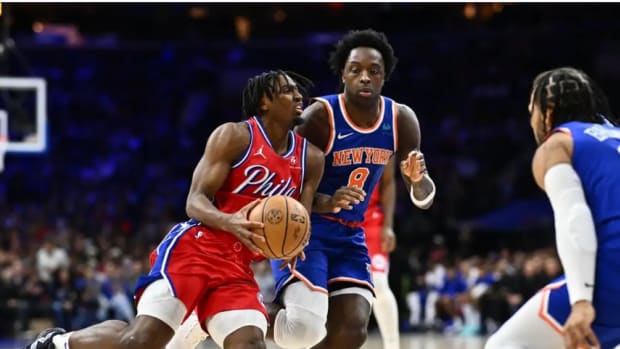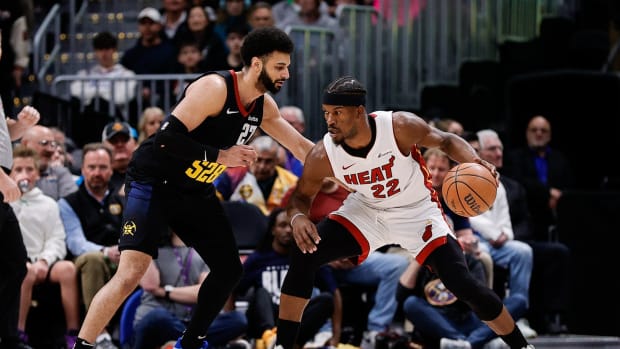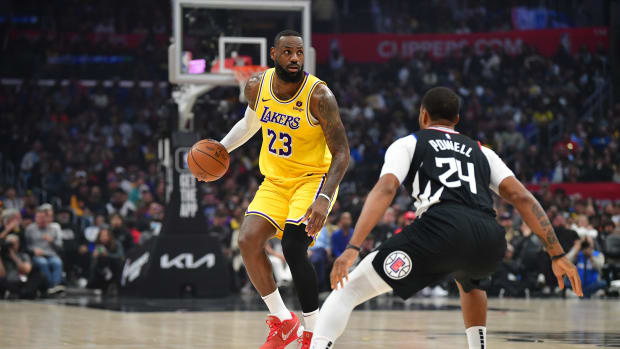David Stern, Through the Years
The former NBA commissioner, who ran the league until 2014, passed away on Wednesday at the age of 77. The league saw unprecedented growth during his tenure, thanks largely to his success in marketing players to the media. However, Stern was much less eager to appease the press when he was the object of attention. What follows are the greatest hits of three decades of SI's coverage of arguably the most successful, and mysterious, commissioner in the history of sports.
The first lengthy portrait of the notoriously elusive commissioner, by E.M. Swift in the June 3, 1991 issue, was completed only after another SI writer, frustrated at the lack of access, gave up on the project.
We open with David Stern striding atop a conference table—surrounded by television executives, gesticulating theatrically, debating a point with his nimble, sharp—edged wit—not because this is the modus operandi of the commissioner of the National Basketball Association, but because the image fits. Even if the event never happened (and there those who doubt that it did), it fits.
“I really don’t think he has the agility to do that,” says Howard Ganz, a chum of Stern’s since their Columbia Law School days in the mid-’60s and a partner at Stern’s former law firm, Proskauer Rose Goetz and Mendelsohn.
“No, I never heard of him jumping on a table,” says Larry Weinberg, chairman emeritus of the Portland Trail Blazers. “I doubt he could jump that high.”
Even Stern can’t quite recall the incident, although he stops well short of denying it. “It’s totally plausible, but as a rule I don’t stand on tables,” he says. “I am an inveterate pacer.”…
To fully appreciate where the NBA is and where it is headed, we must first look back to where the league was just a decade ago. In the 1980–81 season, 16 of the NBA’s 23 teams lost money. Total attendance was down almost a million from the year before, and teams were playing to an average of only 10,021 fans per game, about 58% of the capacity of their arenas. The worst-run franchise in the league, the Cleveland Cavaliers, lost more than $4 million while selling only 28% of its seats in ‘80-81….
Business the old-fashioned way was, pretty much, every franchise for itself. “There was more unanimity in the streets of Paris during the French Revolution than there was in an NBA owners’ meeting,” says one league executive. Free agency had sent salaries spiraling upward, and the question became not whether the league would have to shrink, but how many teams would have to be canned. “In 1982, after dozens of meetings, we came to the conclusion that we were about to lose a half-dozen teams,” recalls Russ Granik, who at the time was the NBA’s general counsel. “We actually set up a committee to study how we were going to do that.”
Out of this abyss stepped Stern. The son of a Manhattan delicatessen owner, Stern was a rare amalgam: a brilliant young lawyer who was blessed with business instincts, marketing sense and a disarming sense of humor. Strangest of all, he was likable. He remembered people’s names. He took an interest in their families. He was, one hears over and over again, a regular guy. A little sarcastic, perhaps, but without a mean bone in him. “David Stern dismisses the adage that nice guys finish last,” says Michael Goldberg, a former general counsel of the American Basketball Association. “David’s father ran a successful deli in New York. To be successful in that business, you have to have great rapport with your customers. You have to get them to come back, even if the corned beef is a little dry and the apple pie a little stale. You have to give the customer a smile, a pleasant greeting, a sense that he is being taken care of. David Stern understands that, and I don’t think it would be farfetched to say that he has applied that to the NBA.”…
Why basketball? Why now? “Every sport has a different niche,” says Stern. “Baseball is loaded with tradition and has all those wonderful statistics. Green grass. Fresh air. Family. Football has that niche of gathering on Sunday afternoons, very passionate followings, few games. Basketball, I think, is very contemporary. Our players have become almost like entertainers. That’s a niche that somehow evolved.”
“David came in and looked at the NBA and saw it as something more than just sports,” says Pistons guard Isiah Thomas, the president of the Players Association. “It’s really just entertainment. It’s a Michael Jackson tour, a Rolling Stones tour. He saw it as an NBA tour.”
One of the models that Stern dangled before NBA owners was Disney. “They have theme parks,” says Stern, “and we have theme parks. Only we call them arenas. They have characters: Mickey Mouse, Goofy. Our characters are named Magic and Michael [Jordan].”
***
In 1998 the NBA was the only of the Big Four leagues never to have lost games to a work stoppage. That changed with a lockout that lasted more than six months, shrinking the season from 82 to 50 games. The deal that restored labor peace In January of '99 (albeit temporarily) was a resounding win for the owners.
“To the Victor Belongs the Spoils”
David Stern is the linebacker who slams the ballcarrier to the turf and then politely picks him up and pats him on the butt. He’s the pool hustler who cleans out his victim’s wallet and then gives him cab fare home. That’s essentially what Stern, the NBA commissioner, did to the National Basketball Players Association last week when he gave the desperate union a few face-saving concessions to forge an agreement, ending the 191-day labor dispute and salvaging an abbreviated season that will start on Feb. 5. He allowed the union to keep its dignity but took almost everything else.
After the settlement on Jan. 6, Stern insisted that Billy Hunter, executive director of the players’ association, had forced him to give up more than he wanted. Stern also implied that he’d had to explain himself to those owners who wondered why he hadn’t gotten a better deal. He wasn’t just being magnanimous; he was being, as always, shrewd. Stern knows he needs the cooperation of the union to win back the fans and that it would serve no useful purpose to give even the slightest appearance of rubbing it in.
But even if he doesn’t want to publicly admit it, Stern won a landmark victory. He made the NBA the only one of the four major pro leagues to have a maximum salary. He rendered agents, such as his nemesis, David Falk, unable to drive bidding wars for their clients into the stratosphere. He made it possible for teams to hold on to their draft choices for five years—two years longer than under the past collective bargaining agreement--before those players become unrestricted free agents. There’s little wonder that one team president said there was “dancing on the tables” when Stern laid out the deal to the owners.
Stern won… which was no surprise; he almost always does. That’s why the owners had the good sense for the last six months to keep their mouths shut and let him work. While the players were talking too much--first putting their hightops in their mouths with ludicrous comments that showed how out of touch they are with the average fan and then hurting the union’s cause by revealing how desperate they were to settle--the owners let Stern be their voice. It’s true that they had a gag order with the threat of a six-figure fine hanging over their heads, but these are wealthy, powerful men. The fear of writing a check didn’t keep them quiet. Confidence in Stern did.
****
As the 2005–06 season wound down, Stern sat with SI’s Phil Taylor to discuss the state of the league—including the challenges involved in recovering from the “Malice at the Palace” and the ensuing, controversial dress code he instituted.
“Q&A: NBA Commissioner David Stern”
SI: One of the ways in which the league has tried to change the way fans view the players is with the dress code. Some would say that just reinforced stereotypes—that a jacket and collared shirt indicates “nice guy,” and baggy jeans and baseball caps turned sideways indicates “thug.”
DS: Maybe it did. Look, last season’s altercation in Detroit [the Malice in the Palace] gave every newspaper writer, every sports-talk host and every call-in person the opportunity to generalize and call every NBA player thugs and punks. If you acknowledge that’s what was going on, the question becomes, What can we do to help our players show who they really are? And one of the answers may be, Let’s eliminate the issue of dress, O.K.? [The guidelines] may seem small, insignificant, and they probably are, but the feeling was, Let’s get rid of the symbolism.
SI: Is there a scenario that would make you choose to get involved in the Knicks' problems?
DS: (Long silence.) I mean, you know, there's a cycle. Some teams are luckier, some teams are not. Some teams are better managed, some teams are not. It happens.
SI: You’ve been commissioner for 22 years. When you finally do leave this job, what will you do?
DS: I’m still a lawyer. Without airing my political views, there some terribly important issues, injustices and inequalities that the world needs to address. And I think those would interest me greatly. Or maybe I’ll write for Sports Illustrated. I have my eye on [Rick] Reilly’s job.
***
Prior to the 2006–07 season, SI’s Jack McCallum was invited to join Stern on a five-country, eight-game, seven-day tour of Europe, during which Stern schmoozed, cajoled, teased, challenged, lectured and charmed sponsors, corporate executives, players, coaches, NBA employees, journalists and fans.
“The World According to David Stern”
Nov. 8, 2006
For someone who has been in the public eye for so long, Stern has been remarkably successful in deflecting requests to participate in behind-the-scenes profiles. He has agreed to this one only after some negotiation and on the understanding that the NBA’s international business (page 63) will play a prominent role in the story. (Stern will no doubt think it’s not prominent enough and will make his feelings known.) Over the course of the trip, pieces of his personal life slip out, though rarely does he offer them.
For example, Stern loved the musical Jersey Boys, the story of Frankie Valli and the Four Seasons. He thinks of himself as a cross between a Manhattanite (Stern’s Delicatessen was in Chelsea) and a Jersey boy (he moved to Teaneck at age 12 and attended Rutgers). He was, he says, 114th in a class of 530 at Teaneck High; he still remembers the stats.
In the past five years Stern has had a few arthroscopic knee surgeries and sometimes limps slightly. But he played recreational hoops as a youth and looks to be, and says he is, in excellent shape. He watches his diet and drinks alcohol sparingly, though on busy days he does ladle in the caffeine. He also has an incurable sweet tooth. (On the plane he tears into the disgusting-looking confection known as Swedish Fish.) He plays tennis regularly, often with his wife of 43 years, Dianne, a freelance writer. (They met through family friends in Teaneck and married during Stern’s first year at Columbia Law School.) The two also enjoy taking long walks and hikes; on David’s only real day off during the European tour, the couple legged it for hours through the streets of Paris….
It troubles him that the league is increasingly doing business in countries with abhorrent or at least questionable government policies.
“Believe me, the China situation bothers me,” Stern says one day, traveling between Paris and Cologne. “And a voice at home [he means Dianne, who is more outspoken about politics than he is] reminds me about it all the time.” He sighs heavily. “But at the end of the day I have a responsibility to my owners to make money,” he says. “I can never forget that, no matter what my personal feelings might be.” Sterndoesn’t expand on that thought, which is atypical; his mind is nothing if not lawyerly, able to slither around and through the most vexing questions. But the road to China is littered with philosophical land mines, and as the NBA snuggles up to Beijing, it will be interesting to see if Stern speaks out when he’s troubled….
As one travels with Stern, it becomes hard not to compare him with another liberal and pragmatist. David Joel Stern is, indisputably, the William Jefferson Clinton of commissioners. They have met on several occasions, and Stern and his wife talk with admiration of Clinton’s friendliness and his ability to expound on almost any subject. The commissioner is nowhere near as charismatic or as recognizable as the 42nd president, but he’s a rock star compared with his peers: Gary Bettman and Roger Goodell come across as well-dressed lawyers (which they are), and Bud Selig is as beguiling as a small-town hardware salesman.
“Charisma is at some level the art of relating to people,” says Don Luongo, a retired U.S. Secret Service agent who sometimes works as Stern’s one-man security force, “and that’s what the commissioner is all about.” Luongo knows about charisma, having been assigned to both Clinton and Ronald Reagan, men he holds in high esteem for their ability to connect to the masses. “Plus, Mr. Stern’s energy level is off the chart,” says Luongo. “People feel that. I feel that. I feed off it.”
Like Clinton, Stern also relishes being the indefatigable iron man, the alpha male who outworks, outschmoozes and outlasts everyone else in the room. He could squeeze in a short nap at the Swissôtel in Moscow, but having found the downstairs coffee lacking, he suddenly claps his hands and, sounding like a high school kid organizing a beer party, says to a reporter and two NBA employees, “Hey, let’s go to my room! I’ve got a great cappuccino machine!” And all adjourn there. Later, en route to the ambassador’s house after the game, Stern dozes, openmouthed, but suddenly cuts into a conversation with a comment about Russian basketball history.
“My only explanation,” whispers Andrew Messick, senior vice president of NBA International, from the seat behind the commissioner, “is that he hears when he sleeps.”
***
After precisely 30 years on the job, Stern was succeeded as commissioner by Adam Silver on Feb. 1, 2014. McCallum reflected on Stern’s career.
Feb. 10, 2014
Several of the disquisitions addressing the end of David Stern’s reign have noted that the NBA will enter a kinder, gentler phase under the commissionership of Adam Silver. That is a low bar indeed since Stern, over the course of three decades, has made owners cave, players quake, union leaders kowtow, employees cry and reporters grovel. And that was all before 10 o’clock on a Monday morning.
But that is essentially a matter of managerial style. The key question is: Now that Vlad the Impaler has ceded sovereignty to Mahatma Gandhi, what difference will it make to the game?
The transfer of power went quietly—given the shadow cast by Super Bowl XLVIII—last Friday afternoon at the NBA offices in midtown Manhattan. Stern and Silver made a joint videoconference appearance to the NBA’s 1,200 employees. True to the promise he had made in an SI interview a week earlier, the 71-year-old Stern did not get choked up. “I’m feeling too good about things to cry,” said Stern. It is not known if any NBA employees wept, either from sorrow or relief.
Silver takes over a league that is in tidy shape thanks to Stern, who came aboard as the league’s chief counsel in 1978 and took the reins from Larry O’Brien six years later. The charge for Silver is to continue to, in Stern’s pet phrase, “grow the game” while maintaining the we-are-the-world mentality that has made the NBA the U.S. league of choice overseas….
[Everyone] knows the size of the wingtips he has to fill. Over the last few weeks comparative metrics have been pouring out of the NBA office that demonstrate the transformation of the league under Stern. Consider:
• League revenue in 1984, the year Stern became commissioner: $165 million.
• League revenue in 2013: $5.5 billion.
• Gross retail merchandise sales in 1984: $35 million.
• Gross retail merchandise sales in 2013: $3 billion.
• Salary cap in 1984, when Stern instituted it: $3.6 million.
• Salary cap in 2013: $58.1 million.
On and on it goes. To a portion of the population, though, those numbers mean nothing. The NBA is still déclassé and destined to remain so….
From another perspective, though, a younger one perhaps, the NBA couldn’t be healthier. TV ratings are better than ever; the power of its supernovas (LeBron James, Kevin Durant, Blake Griffin, Chris Paul, even a fading Kobe Bryant) outshines those in any other sport (with the exception of Peyton Manning); and the league is thriving on distant shores. And there was one D. Stern on a recent Letterman reading the Top 10 things he has learned as a commissioner. (No. 6: I’m the only guy in the league who was bar mitzvah’d.) His performance was hardly Emmy-worthy, but it’s doubtful that Bud Selig will get that call when he steps down.
How much Stern was responsible for all the growth remains an intriguing question, the boardroom counterpart to Is Phil Jackson a great coach or did he ride the Michael-Shaq-Kobe train to 11 championships? Both have no provable answers, though this one is hereby proffered:
Just as Jackson wouldn’t have been as good without the alpha dogs, and the alpha dogs wouldn’t have been as good without Jackson, so it is that Stern would not have done nearly as well without the supercharged impetus provided by the stars of the 1980s, and the NBA would not have done nearly as well without the hard-charging braniac business sense of Stern.
***
Four-and-a-half years into his retirement, Stern (reluctantly, of course) welcomed SI’s Chris Ballard into his world for a day.
Oct. 22, 2018
His was a triumphant, carefully choreographed exit. On Feb. 1, 2014, after a nice round anniversary, Stern handed the job to his hand-picked successor, Adam Silver. Six months later Stern was inducted into the Hall of Fame.
What Stern didn’t do, in any way, shape or form, was retire. “He hates when people say that,” says Silver. No, Stern will explain with exasperation, as if you are a third-grader who forgot his homework yet again, all he did was step down. And just so we’re clear: He did so on his terms. Because retiring is something old people do. Boring people. People unlike David Stern.
Even so, you could be forgiven for assuming that he had. In the half decade since, Stern has mostly dropped out of public view. No memoir to burnish his legacy—despite what he describes as “many, many” entreaties from literary agents. (“Too self-important,” he explains. “Just thinking about it gives me a rash!”) Stern agrees to infrequent interviews, which are usually brief or esoteric. Occasionally, he shares anecdotes—how he once beat Donald Trump at doubles tennis, for example—but rarely does he go into detail because, he says, “I don’t do war stories.” On the contrary, he’s made an effort to limit his exposure. Upon hearing that his Q&A at Seton Hall in April with former players association head Charlie Grantham is now on YouTube, he says, “Was that recorded? Oh s---.” The reason for this reticence, Stern says, is that, “There can be only one commissioner.”…
Most weeks Stern spends his Monday at Greycroft, the New York City venture capital firm where he is a senior adviser. Fridays he tries to take off. The majority of the time, though, he works in his spacious office, which has the feel of an extremely well-lit museum. His desk is meticulously organized; pencils separated from pens, an NBA-branded memo pad, a ripped-out newspaper story on top of stacked folders. (Stern, who prefers news to books, pores over three papers in print each day.) The other available spaces are filled with photos of Stern alongside various important folks: Mandela, Bill Clinton, Phil Jackson, Magic, Ronald Reagan. His Columbia law degree hangs on one wall. On another is a Sacramento Bee comic strip depicting him as Superman, printed after he worked to keep the Kings in town in 2013.
Stern’s days are full of tightly clustered meetings. The previous day, among other things, he had: filmed a clip at NBA headquarters for the Hornets' 30th anniversary; visited with the president of the EuroLeague; met with an exec from Paddy Power Betfair; talked investments with a banker over lunch; sat with NHL commissioner Gary Bettman's son, who works for a tech firm; and met with, "someone raising $260 million to do podcasts—don't ask." He prefers to do business in person or on the phone, even if it feels antiquated. "We have younger friends, they don't even answer their goddam phones," he laments. "If you don't email or text, they don't respond. A whole other generation out there."…
“I’m not sure I would have been the right guy in 1984, when David became commissioner,” says Silver. “David had to fight every step along the way for respect for the NBA. I inherited a very different situation. A transcendent league, one that was clearly still on the ascent. The charge for me was: Don’t screw it up. David was faced with an entirely different set of circumstances. Whether David adopted his personality for the times or that’s who he always was, I’m not sure.”
I’d add to that: Does it matter? Probably not, though I suspect that he was born that way. If I learned one thing about Stern, it’s that he’s one of those people whose hobby—whose passion—has always been the same as their job. The reason he didn’t change tracks after leaving the NBA is because what he really wanted to do was what he’d already been doing, what he’d always wanted to do, what he will always want to do. Be in charge. Be the smartest guy in the room. Get involved in other people’s business before they get involved in his. Tackle one puzzle after another, energized not by the solving but the knowledge that another puzzle awaits, and another after that. The real fear is of a time when no more exist.
So why look back when you can look forward, peeking around the next corner, and the one after that? Why revel in the past when tomorrow awaits?
How much longer will he keep doing this? I ask Stern. “Until whenever,” he says. “Why think about the end?”




































